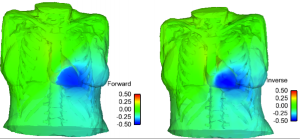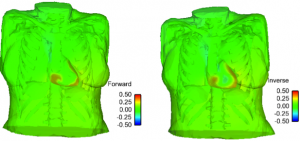The goal of EPICARD is to develop new mathematical approaches for solving different inverse problems in cardiac electrophysiology, in order to help cardiologist to better diagnosis the electrical pathologies in the heart.
Scientific achievements
-
Application of three mathematical approaches to solve the inverse problem in electrocardiography. The results show an improvement of the reconstructed electrical signals with respect to the state of the art used methods.
-
Proof that neglecting the heterogeneity in the torso conductivity has a high impact on the reconstructed electrical signals.
Principal Investigators
-
Nejib Zemzemi, Inria Bordeaux Sud-Ouest, and IHU LIRYC, Inria associate-team CARMEN
-
Nabil Gmati, Tunis El Manar University. LAMSIN, Tunisia
Composition of the team
-
4 Phd students (one of them has already defended her PHD
-
One postdoc ; Contract finished in 2014
-
8 researchers
Publications and Awards
-
3 journal papers, 7 conference papers, 8 conference abstracts with poster and/or talk.
-
ADT-2016 award
-
Technology development action award : 24 months engineer support to develop two modules including our scientific findings.
Selected publications
-
Aboulaich, R., Fikal, N., El Guarmah, E., & Zemzemi, N. (2016). Stochastic Finite Element Method for torso conductivity uncertainties quantification in electrocardiography inverse problem. Mathematical Modelling of Natural Phenomena, 11(2), 1-19.
-
Zemzemi,N., Dobrzynski, C., Bear L., Potse, M., Dallet, C., et.al. Effect of the torso conductivity heterogeneities on the ECGI inverse problem solution. Computing in cardiology, Sep 2015, 233 – 236 Nice, France. http://www.cinc2015.org/
Related news
-
Stand at the R2I on the Dispositif médical, objets connectés, systèmes d’information : quelle gestion de la convergence numérique? Le 13/10/2015, Palais de la Bourse, Bordeaux.
-
Jamila Lassoued’s PHD defense of: Méthodes mahtématiques en électrophysiologie cardiaque, le 20 Juillet 2016 au LAMSIN Tunis

Comparison between the forward problem solution (first column) and the computed solution of the inverse problem (second column)

Top: a snapshot of the electrical potential distribution in case of apex stimulation. Bottom: a snapshot of the electrical potential distribution for re-entry simulation.

